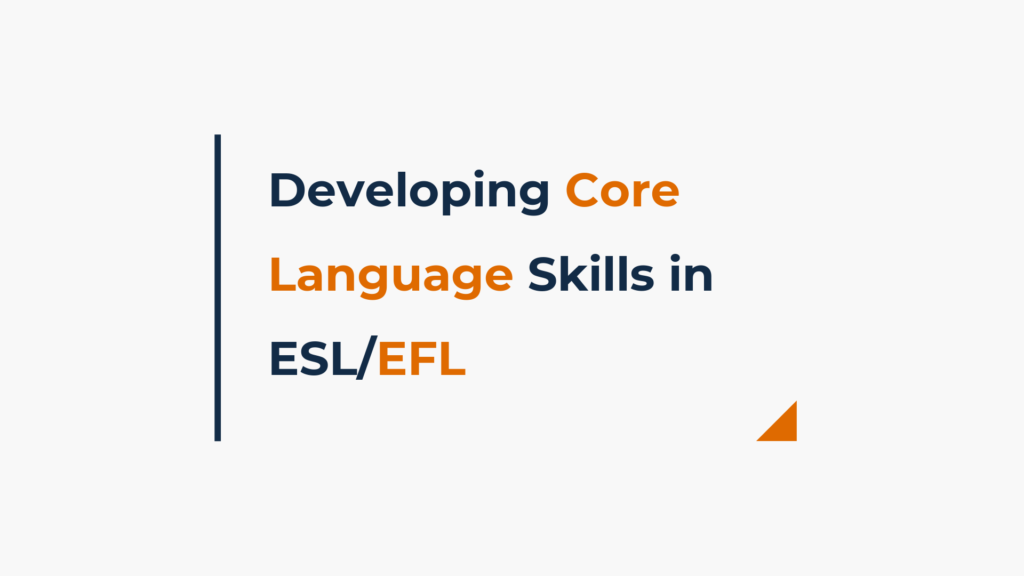-
Strategies for Integrating Language Skills in ESL Lesson Plans
Our focus this week is on the strategic integration of language skills – speaking, listening, reading, and writing – into ESL lesson plans. This academic approach aims to provide educators with a thorough understanding and practical methods to foster comprehensive language development.
Theoretical Foundations of Integrated Language Learning: Integrating language skills in ESL instruction is rooted in the communicative approach, which emphasizes language as a tool for meaningful interaction. It’s essential to create learning experiences where skills are not isolated but interwoven, reflecting the way language functions in real life.
1. Synchronous Development of Speaking and Listening Skills:
- Rationale: Speaking and listening are naturally interconnected in communication. Enhancing these skills simultaneously allows for a more organic language acquisition process.
- Beginner Level: Implement call-and-response activities where students listen to a phrase and repeat or answer. Use simple dialogues focusing on everyday scenarios.
- Advanced Level: Engage in complex group discussions, debates, or presentations on academic topics or current affairs. This not only hones speaking skills but also challenges students’ listening comprehension and critical thinking.
- Academic Activity: Organize a ‘listening journal’ project where students reflect on listening experiences, analyzing spoken language use, noting unfamiliar vocabulary, and discussing cultural nuances observed.
2. Integration of Reading with Writing Skills:
- Rationale: Reading exposes students to diverse language structures and vocabulary, which they can then emulate in writing, reinforcing their grasp of language conventions.
- Beginner Level: Start with reading simple narratives or informational texts followed by writing summaries or personal responses.
- Advanced Level: Assign the reading of scholarly articles or literature followed by structured writing assignments like research papers or literary analysis, which require critical engagement with the text.
- Academic Activity: Create a peer-review workshop where students critique each other’s written summaries or analyses of the text, promoting deeper engagement and understanding.
3. Coalescing Reading with Speaking and Listening:
- Rationale: This integration allows students to process and internalize information through multiple modalities, enhancing retention and comprehension.
- All Levels: Implement read-aloud sessions, followed by discussion groups or comprehension questionnaires, catering to both auditory and verbal learning styles.
- Academic Activity: Facilitate a literature circle where students read different books, discuss them in groups, and present summaries or critiques, encouraging active engagement with the text and collaborative learning.
4. Technology-Enhanced Integration:
- Rationale: Digital tools offer dynamic, interactive platforms for integrating language skills, providing a diverse range of stimuli and contexts.
- All Levels: Utilize language learning software and apps that offer integrated skill tasks, from reading passages with comprehension questions to interactive speaking and writing exercises.
- Academic Activity: Incorporate multimedia presentations where students research a topic (reading), create a presentation (writing), and then present it to the class (speaking), followed by a Q&A session (listening and speaking).
5. Project-Based Language Integration:
- Rationale: Project-based learning (PBL) in language instruction provides a practical, engaging framework for applying and connecting all language skills.
- All Levels: Develop comprehensive projects like creating a class newspaper, where students research (reading), write articles (writing), conduct interviews (speaking), and listen to guest speakers (listening).
- Academic Activity: Organize a cross-cultural exchange project with a class from another country, involving email correspondence (writing), video calls (speaking and listening), and sharing cultural articles (reading).
Through these academically-informed strategies, ESL educators can effectively blend language skills in their lesson plans, facilitating a more holistic and authentic language learning experience. Next session, we will explore creative approaches to language practice, further enhancing our toolkit for effective ESL instruction.
eflcafe.net
Developing Core Language Skills in ESL/EFL – EFLCafe.net
Developing Core Language Skills in ESL/EFL – EFLCafe.net
Sorry, there were no replies found.
Log in to reply.
